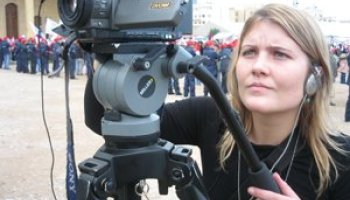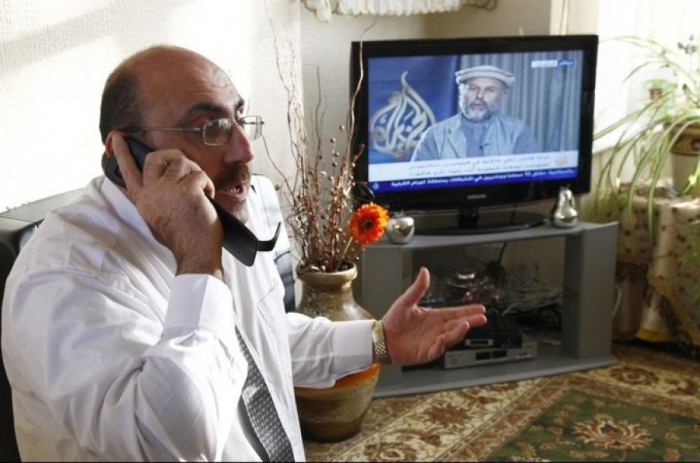Andrew Nicholson / May 24, 2016
For anyone who believes Australia’s cherished national broadcaster, the ABC, is an impartial and objective reporter of what is happening across the globe, it’s time for a rethink. Any pretence of the ABC’s journalistic objectivity and integrity have all but evaporated in the heat of the Syrian conflict of the past five years.
ABC Middle East correspondent, Sophie McNeill, in particular, has been vehemently one-sided in her reporting of this complicated, multifaceted conflict.
In fact, McNeill appears to have a personal vendetta against the Syrian leader, Syrian government, Syrian Arab Army and all those Syrians who have thrown their overwhelming support behind their leader, government and army.
This “objective” journalist has openly called for regime change in Syria on more than one occasion. McNeill’s reports clearly cross the increasingly blurred line between uncompromising, unbiased reporting and all-out activism.

Walkley Award winner & cheerleader for regime change in Syria. Photo SBS
Take the following example from August last year, Islamic State will thrive while president Assad’s atrocities go unpunished, Middle East correspondent reports.
This ABC report begins: “The Syrian conflict continues with no end in sight and as long as the West fails to act against the Assad government, Islamic State will continue to flourish, writes Middle East correspondent Sophie McNeill.”
A curious premise given that the Syrian Army (often referred to by the ABC as Assad’s forces or regime forces), has always been, and will continue to be, at the frontline of the bloody fight against Islamic State.
The crimes committed by the Islamic group are horrific and unimaginable to most Australians. Torture, rape, slavery, beheadings, suicide bombings — there has never been a group as callous and with total disregard for other human beings lives.Everything possible needs to be done to ensure their so-called caliphate comes to an end. But when you look at the numbers of deaths in Syria, IS militants are responsible for a fraction of the civilian deaths.According to a new study out this week by the Syrian Network for Human Rights — Syrian government forces caused 75 per cent of Syrian civilian deaths this year. This is where the horrific IS comes in. Mr Assad’s unpunished crimes in Syria have been, and continue to be, a huge recruitment tool for the terrorists.
For a moment, forget the unsubstantiated statement that “government forces caused 75 per cent of Syrian civilian deaths this year“.
Let’s first consider McNeill’s incredulous leap in logic that Assad’s “unpunished crimes” provide the perfect recruitment drive for IS. Given that IS recruits appear to be predominately foreign fighters rather than home grown Syrian wahhabi wannabes, this assertion is non-sensical.
Deep Saudi pockets together with western bombing missions and killer drone strikes in Afghanistan, Libya, Iraq, Yemen and Syria provide a far greater inspiration for aspiring young terror recruits from the likes of the UK, Europe, Northern Africa, Canada and Australia.
Now, back to the assertion that 75 per cent of civilian deaths this year have been caused by government forces. This figure, the report states, is quoted in “a new study out this week by the Syrian Network for Human Rights”.
How has this figure been determined given the obvious difficulties of accurately obtaining and verifying such figures in a war zone?
How about the study itself?
Well, McNeill failed to shed any further light on this “new study”. So, I guess we must trust her on that one that it’s legit.
And what of the Syrian Network for Human Rights?
Nope. No illumination for the dear reader on just who exactly that group is either.
McNeill’s piece is either a case of shoddy, sloppy reporting, or … there are some things she believes are better left unwritten.
Dubious sources
According to that fountain of all knowledge, Wikipedia: “the Syrian Network for Human Rights is a UK-based non-governmental organization, founded in June 2011, which monitors the Syrian Civil War. The organization’s chairman is Fadel Abdul Ghani. It has been routinely cited by news media, as well as by the United Nations High Commissioner for Human Rights on at least one occasion.”
On its website, the organisation claims it is an independent, non-partisan, non-governmental, non-profit organisation. However, a quick review of the organisation’s content on that same site reveals it to be very partisan indeed, and anti-government to boot.
So does this mean the ABC should not quote any of the information this organisation provides? Not necessarily. But if it does, it should, at the least, advise the reader of the organisation’s anti-government stance. Allow the reader to make up their own mind as to the level of credibility they afford it.
McNeill’s favourite source for everything that’s happening on the ground in Syria, however, is The Syrian Observatory for Human Rights. A one-man band with an axe to grind operating out of a two-bedroom terrace in Coventry.

Abdulrahman sitting in his Observatory.
To be fair, the ABC is not alone in referencing this so-called organisation. It’s a popular source of information for western journalists reporting on the conflict from the comfort and safety of their far away news rooms.
But like the Syrian Network for Human Rights, the Syrian Observatory for Human Rights is hardly an objective source.
In December 2011, just as the conflict was igniting Reuters reported on the SOHR in Coventry – an unlikely home to prominent Syria activist:
When he isn’t fielding calls from international media, Abdulrahman is a few minutes down the road at his clothes shop, which he runs with his wife.Cited by virtually every major news outlet since an uprising against the iron rule of Syrian President Bashar al-Assad began in March, the observatory has been a key source of news on the events in Syria.After three short spells in prison in Syria for pro-democracy activism, Abdulrahman came to Britain in 2000 fearing a longer, fourth jail term.“I came to Britain the day Hafez al-Assad died, and I’ll return when Bashar al-Assad goes,” Abdulrahman said.
Abdulrahman has also admitted to receiving funds from the EU and an unnamed European country according to The New York Times.
Tony Cartalucci, an independent American geopolitical analyst based in Thailand, had this to say about the integrity of the SOHR back in 2013:
One could not fathom a more unreliable, compromised, biased source of information, yet for the past two years, his “Observatory” has served as the sole source of information for the endless torrent of propaganda emanating from the Western media. Perhaps worst of all, is that the United Nations uses this compromised, absurdly overt source of propaganda as the basis for its various reports
As unreliable, compromised and biased as the Syrian Observatory for Human Rights may be, that doesn’t deter McNeill and her colleagues from constantly referencing this “absurdly overt source of propaganda”.
… and unfounded claims
In fact, McNeill did just that this Monday, 23 May, making the sensational unsubstantiated claim that: Syria conflict: Monitoring group’s report finds 60,000 people died in jails in past five years.
The Syrian Observatory for Human Rights (SOHR) report said tens of thousands of people had been killed by the regime of Bashar al Assad, either as a direct result of torture or denial of food and medicine. SOHR, a British-based monitoring group, said it had arrived at the number by adding up death tolls provided by sources in several Syrian jails and security agencies.
Being the ever-curious investigative journalist, McNeill obviously questioned SOHR on who its sources were and exactly what Syrian jails the figures were taken from and …
Oops. Sorry.
And what about the math? That’s 33 dead prisoners for every single day of the year for the past five years.
Fellow ABC Middle East correspondent, Matt Brown, who has reported on the Syrian conflict mostly from the Turkish side (both geographically and ideologically) also highlighted the allegations of systematic torture and execution within Syrian jails.
In Mass deaths of detainees in Syrian Government jails amounts to crime of ‘extermination’, UN report says published on 9 February Brown writes:
United Nations investigators have accused the Syrian Government of “extermination” in its jails and detention centres, saying prisoners have been executed, tortured to death or held in such horrific conditions that they perished.
In somewhat of a contradiction to McNeill’s more recent report, Brown stated that: “Thousands of detainees have been killed while being held by different sides in Syria’s brutal conflict since the violence began nearly five years ago, the UN Commission of Inquiry on Syria said in its latest report.”
Brown also referenced the Caesar photos which have been largely discredited and were even questioned back in 2014 by pro-western propaganda outlet, CNN in Syria: Photos charging mass torture by regime ‘fake’.
Brown writes:
The report adds to a huge body of evidence from the commission and others, detailing horrific abuse, torture and killings in Syrian-run jails. The so-called Caesar Report released in early 2014, contained some 55,000 photographs depicting the tortured and abused bodies of around 11,000 people it said had died in Syrian jails during the first two years of the conflict.
The so-called Caesar torture photos just happened to be released two days before negotiations on the Syrian conflict were due to begin in Switzerland. The 55,000-odd photos said to document the torture and deaths of 11,000 prisoners were apparently compiled by a Syrian army photographer who went only by the nom de guerre Caesar.
While most mainstream media eagerly ran with the story without questioning its veracity, the Christian Science Monitor(a media outlet that in no way could be accused of being enamoured with the Syrian President) smelled a rat.
This is a single source report, from an unidentified man, who is related by marriage (according to a footnote on page 15 of the report) to a similarly unidentified member of the “Syrian National Movement” who “left Syria five days after the civil war against the current Syrian regime had begun and established contact with international human rights groups.” The Syrian National Movement has been funded by Qatar and is devoted to Assad’s downfall and the source has been working with this unidentified Assad opponent since “around September 2011.”
Writing in Counterpunch on 4 March 2016, Rick Sterling, co-founder of Syria Solidarity Movement, goes further making the case that not only are the origins of the photos dubious, but that the photos, rather than documenting the torture and execution of Syrian prisoners, instead document the deaths of soldiers and civilians in the conflict and most likely originated from hospitals and morgues.
You can read Sterling’s analysis in The Caesar Photo Fraud that Undermined Syrian Negotiations.
Standards of objective journalism
These are just several examples of apparent bias, or at least shoddy reporting, by the ABC’s Middle East correspondents.
There are many more. For example, you are unlikely to hear the voices of Syrians who support their leader, government and/or army (of which there are many given the results of the last two elections held in the country).
Likewise, you will not hear about the devastating effects Russian involvement in the conflict is having on IS and the other terrorist groups fighting in the country. No, ABC there are no “moderate rebels”. That’s a Kerry-concocted fallacy. They are terrorists, mostly foreign, and all foreign-backed.
It’s time the ABC provided the Australian public with a more balanced view. We deserve nothing less. And it’s written in the ABC’s Editorial Policies no less.
The ABC has a statutory duty to ensure that the gathering and presentation of news and information is impartial according to the recognised standards of objective journalism.
Ending on a bright note, here’s a positive story from Syria you won’t find on the ABC or other western media outlets. Written by Canadian peace activist Ken Stone, it showcases the country’s reconciliation efforts.


![[GRAPHIC] ISIL used chemical weapons against Kobani Kurdish fighters](https://blogger.googleusercontent.com/img/b/R29vZ2xl/AVvXsEhHHkqaTT8A0fqryGP3Ve1iq1FaYfvi_xAs1XrGuUkai61POujKThWsVbWRRYXKHkkz9u45BnJgIu12L1FrwoDCXeyvAaeX2qPGdfNrdhm5daKPe_ukGSi00XngLQ1qDPhhO5QoQ9HjcYc/w100/DSC04748.jpg)







0 Comments